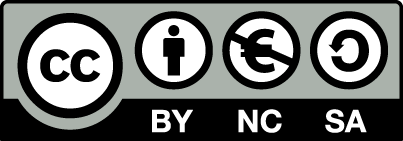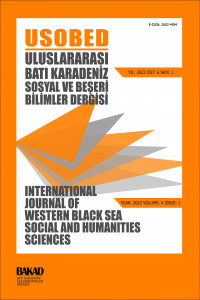A RESEARCH ON THE EVALUATION OF THE PERSPECTIVES OF ENTERPRISES ON ACCOUNTING PROFESSION AND PROFESSIONAL MEMBERS
Abstract
Accounting is a career built on a shared goal, teamwork, adherence to professional standards and ethics, and a human aspect at its center. There is a common misconception concerning the accounting profession. Accounting is viewed as a mediator for the calculation and collection of taxes on behalf of the state.
The purpose of this research is to investigate the perspectives and perceptions of accounting firms and accounting professionals in Diyarbakir. Face-to-face surveys of companies were conducted for this reason. According to the findings of the survey, the majority of businesses have changed accounting professionals within the last ten years. Accounting professionals are believed to aid organisations in practically every area conceivable. Accounting professionals, in particular, consider themselves to be financial counselors. It is mentioned that the taxpayers' accounting information is inadequate, and they wish to improve in this area. Additionally, it believes that the fees paid by businesses to accounting specialists are enough. Accounting specialists are frequently used by organisations to assist them with tax and financial concerns. It is assumed that the majority of participants' accounting expertise matches the demand in financial affairs, but there is little need for production issues. The majority of participants were found to meet with accounting experts once a month. It is commonly concluded that these calls are made over the phone. In summary, accounting information has been discovered to be utilised in practically every aspect of business. Furthermore, accountants are seen as financial consultants by taxpayers.
References
- Ariela Caglio, Mara Cameran & Jane Klobas (2019). What is an Accountant? An investigation of images, European Accounting Review, 28:5, 849-871.
- Arquero, J. L., Hassall, T., Joyce, J., & Donoso, J. A. (2007). Accounting students and communication apprehension: A study of Spanish and UK students. European Accounting Review, 16(2), 299–322. doi:10.1080/09638180701391337.
- Bougen, P. D. (1994). Joking apart: The serious side to the accountant stereotype. Accounting, Organizations and Society, 19, 319–335.
- Buffini, F., & Cornell, A. (2005). Top talent deserts the professions. Australian Financial Review, January 8–9, pp. 13–15.
- Caglio, A. (2003). Enterprise Resource Planning systems and accountants: Towards hybridization? European Accounting Review, 12(1), 123-153. doi:10.1080/09638180310000 87853.
- Carnegie, D.G. ve Edwards, J.R. (2001). The construction of the professional accountant: the case of the Incorporated Institute of Accountants, Victoria (1886). Accounting, Organizations and Society. 26(4–5): 301-325.
- Carnegie, G. D., & Napier, C. D. (2010). Traditional accountants and business professionals: Portraying the accounting profession after Enron. Accounting, Organizations and Society, 35(3), 360–376. doi:10.1016/j.aos.2009.09.002.
- Çelik, M. (2008). 21. Yüzyılda Muhasebe Mesleği’nin Vizyonu. Pamukkale Üniversitesi Sosyal Bilimler Enstitüsü Yayınlanmamış Yüksek Lisans Tezi. İşletme Anabilim Dalı, Muhasebe Finansman Bilim Dalı. Denizli.
- Felton, S., Dimnik, T., & Bay, D. (2008). Perceptions of accountants’ ethics: Evidence from their portrayal in cinema. Journal of Business Ethics, 83, 217–232.
- Friedman, A. L., & Lyne, S. R. (2001). The beancounter stereotype: Towards a general model of stereotype generation. Critical Perspectives on Accounting, 12, 423–451.
- Guo, K. H. (2015). The institutionalization of commercialism in the accounting profession: An identity experimentation perspective. Auditing: A Journal of Practice and Theory, 35(3), 99–117. doi:10.2308/ajpt-51337.
- Hunt, S. C., Falgiani, A. A., Intrieri, R. C., & Papini, M. T. (2009). The effect of gender and knowledge on students’ impressions of accountants in the post-Enron era. Journal of Business and Economics Research, 7(5), 1–13. doi:10.19030/jber.v7i5.2285.
- Jeacle, I. (2008). Beyond the boring grey: The construction of the colourful accountant. Critical Perspectives on Accounting, 19, 1296–1320
- Klibi, M. F., Oussii, A. A. (2013). Skills and attributes needed for success in accounting career: Do employers’ expectations fit with students’ perceptions? Evidence from Tunisia. International Journal of Business and management, Vol. 8. No. 8. p. 118-132
- Lee, T. A. (2006). The professional journal as a signal of movement to occupational ascendancy and as legitimation of a professional project: The early history of The Accountant’s Magazine 1897–1951. Accounting History, 11, 7–40.
- Lips, H. M. (1992). Gender and science-related attitudes as predictors of college students’ academic choices. Journal of Vocational Behavior, 40(1), 62–81. doi:10.1016/0001-8791(92)90047-4.
- Richins, G., Stapleton, A. Stratopoulos, T.C. & Wong, C. (2017). Big data analytics: Opportunity or threat for the accounting profession?, Journal of Information Systems 31(3): 63–79. https://doi.org/10.2308/isys-51805
- Rogers, R. K., Dillard, J., & Yuthas, K. (2005). The accounting profession: Substantive change and/or image management. Journal of Business Ethics, 58(1-3), 159–176. doi:10.1007/s10551-005-1401-z.
- Scapens, R. W., & Jazayeri, M. (2003). ERP systems and management accounting change: Opportunities or impacts? A research note. European Accounting Review, 12(1), 201–233. doi:10.1080/0963818031000087907.
- Smith, M., & Briggs, S. (1999). From bean-counter to action hero: Changing the image of the accountant. Management Accounting, 77(1), 28–30.
- West, B.P. (2001). On the social history of accounting: The bank audit by Bruce Marshall. Accounting History, 6, 11–30.
- Yu, S., Churyk, N. T. & Chang, A. (2013). Are students ready for their future accounting careers? Insights from observed perception GAPS among Emploiers, Interns and Alumni. Global Perspectives on Accounting Education, Volume 10, p. 1-15.
İŞLETMELERİN MUHASEBE MESLEĞİNE VE MESLEK MENSUPLARINA BAKIŞ AÇILARININ DEĞERLENDİRİLMESİ ÜZERİNE BİR ARAŞTIRMA
Abstract
Muhasebe mesleği, ortak bir amaç, iş birliğine dayalı ve mesleki kural ve ilkelere doğrultusunda faaliyetlerini sürdüren ve temelinde insan unsuru olan bir meslektir. Muhasebe mesleğine yönelik olarak yanlış bir algı söz konusudur. Muhasebe meslek mensubu devlet adına vergi hesaplayan ve tahsili için aracı olarak görülmektedir.
Bu çalışma Diyarbakır’da faaliyet gösteren işletmelerin muhasebe mesleğine ve muhasebe meslek mensubuna bakış açısı ve algısının belirlenmesi amacını taşımaktadır. Bu amaçla işletmelere yüz yüze anket uygulaması gerçekleştirilmiştir. Çalışma sonucunda işletmelerin büyük bir çoğunluğunun 10 yılın altında muhasebe meslek mensubu değişimine gittiği tespit edilmiştir. İşletmeler muhasebe meslek mensuplarından mümkün olduğunca hemen hemen her konuda faydalandıkları görülmektedir. Özellikle muhasebe meslek mensuplarını finansal bir danışman olarak görmektedir. Mükelleflerin muhasebe bilgilerinin yetersiz olduğu ve bu alanda gelişmek istedikleri belirtilmiştir. Ayrıca işletmelerin muhasebe meslek mensuplarına ödediği ücretin yeterli düzeyde olduğunu düşünmektedir. İşletmeler muhasebe meslek mensuplarından genellikle vergi ve finansal konular hakkında destek aldıkları görülmektedir. Katılımcıların büyük bir çoğunluğunun muhasebe bilgisinin genellikle finansal konularda ihtiyacı karşıladığı, fakat üretim konularında çok fazla ihtiyaç olmadığı düşünülmektedir. Katılımcıların büyük çoğunluğunun ayda bir kez muhasebe meslek mensubu ile görüştüğü tespit edilmiştir. Genellikle bu görüşmeler telefon aracılığıyla olduğu tespit edilmiştir. Kısaca muhasebe bilgilerinin işletmelerin hemen hemen her alanında kullanıldığı tespit edilmiştir. Ayrıca mükellefler muhasebe meslek mensuplarını bir finansal danışman olarak görmektedir.
References
- Ariela Caglio, Mara Cameran & Jane Klobas (2019). What is an Accountant? An investigation of images, European Accounting Review, 28:5, 849-871.
- Arquero, J. L., Hassall, T., Joyce, J., & Donoso, J. A. (2007). Accounting students and communication apprehension: A study of Spanish and UK students. European Accounting Review, 16(2), 299–322. doi:10.1080/09638180701391337.
- Bougen, P. D. (1994). Joking apart: The serious side to the accountant stereotype. Accounting, Organizations and Society, 19, 319–335.
- Buffini, F., & Cornell, A. (2005). Top talent deserts the professions. Australian Financial Review, January 8–9, pp. 13–15.
- Caglio, A. (2003). Enterprise Resource Planning systems and accountants: Towards hybridization? European Accounting Review, 12(1), 123-153. doi:10.1080/09638180310000 87853.
- Carnegie, D.G. ve Edwards, J.R. (2001). The construction of the professional accountant: the case of the Incorporated Institute of Accountants, Victoria (1886). Accounting, Organizations and Society. 26(4–5): 301-325.
- Carnegie, G. D., & Napier, C. D. (2010). Traditional accountants and business professionals: Portraying the accounting profession after Enron. Accounting, Organizations and Society, 35(3), 360–376. doi:10.1016/j.aos.2009.09.002.
- Çelik, M. (2008). 21. Yüzyılda Muhasebe Mesleği’nin Vizyonu. Pamukkale Üniversitesi Sosyal Bilimler Enstitüsü Yayınlanmamış Yüksek Lisans Tezi. İşletme Anabilim Dalı, Muhasebe Finansman Bilim Dalı. Denizli.
- Felton, S., Dimnik, T., & Bay, D. (2008). Perceptions of accountants’ ethics: Evidence from their portrayal in cinema. Journal of Business Ethics, 83, 217–232.
- Friedman, A. L., & Lyne, S. R. (2001). The beancounter stereotype: Towards a general model of stereotype generation. Critical Perspectives on Accounting, 12, 423–451.
- Guo, K. H. (2015). The institutionalization of commercialism in the accounting profession: An identity experimentation perspective. Auditing: A Journal of Practice and Theory, 35(3), 99–117. doi:10.2308/ajpt-51337.
- Hunt, S. C., Falgiani, A. A., Intrieri, R. C., & Papini, M. T. (2009). The effect of gender and knowledge on students’ impressions of accountants in the post-Enron era. Journal of Business and Economics Research, 7(5), 1–13. doi:10.19030/jber.v7i5.2285.
- Jeacle, I. (2008). Beyond the boring grey: The construction of the colourful accountant. Critical Perspectives on Accounting, 19, 1296–1320
- Klibi, M. F., Oussii, A. A. (2013). Skills and attributes needed for success in accounting career: Do employers’ expectations fit with students’ perceptions? Evidence from Tunisia. International Journal of Business and management, Vol. 8. No. 8. p. 118-132
- Lee, T. A. (2006). The professional journal as a signal of movement to occupational ascendancy and as legitimation of a professional project: The early history of The Accountant’s Magazine 1897–1951. Accounting History, 11, 7–40.
- Lips, H. M. (1992). Gender and science-related attitudes as predictors of college students’ academic choices. Journal of Vocational Behavior, 40(1), 62–81. doi:10.1016/0001-8791(92)90047-4.
- Richins, G., Stapleton, A. Stratopoulos, T.C. & Wong, C. (2017). Big data analytics: Opportunity or threat for the accounting profession?, Journal of Information Systems 31(3): 63–79. https://doi.org/10.2308/isys-51805
- Rogers, R. K., Dillard, J., & Yuthas, K. (2005). The accounting profession: Substantive change and/or image management. Journal of Business Ethics, 58(1-3), 159–176. doi:10.1007/s10551-005-1401-z.
- Scapens, R. W., & Jazayeri, M. (2003). ERP systems and management accounting change: Opportunities or impacts? A research note. European Accounting Review, 12(1), 201–233. doi:10.1080/0963818031000087907.
- Smith, M., & Briggs, S. (1999). From bean-counter to action hero: Changing the image of the accountant. Management Accounting, 77(1), 28–30.
- West, B.P. (2001). On the social history of accounting: The bank audit by Bruce Marshall. Accounting History, 6, 11–30.
- Yu, S., Churyk, N. T. & Chang, A. (2013). Are students ready for their future accounting careers? Insights from observed perception GAPS among Emploiers, Interns and Alumni. Global Perspectives on Accounting Education, Volume 10, p. 1-15.
Details
| Primary Language | Turkish |
|---|---|
| Subjects | Business Administration |
| Journal Section | Research Article |
| Authors | |
| Publication Date | June 30, 2022 |
| Submission Date | May 11, 2022 |
| Acceptance Date | June 16, 2022 |
| Published in Issue | Year 2022 Volume: 6 Issue: 1 |
Cited By
BİLGİ KAYNAKLARININ DENETİM MESLEĞİ VE DENETÇİLER HAKKINDAKİ BASMAKALIP DÜŞÜNCELER ÜZERİNDEKİ ETKİSİ
Izmir Democracy University Social Sciences Journal
https://doi.org/10.61127/idusos.1451919
All articles sent to the journal are checked by the plagiarism program before the evaluation process.
USOBED works under Creative Commons Attribution-NonCommercial-ShareAlike 4.0 International (CC BY-NC-SA 4.0). https://creativecommons.org/licenses/by-nc-sa/4.0/



